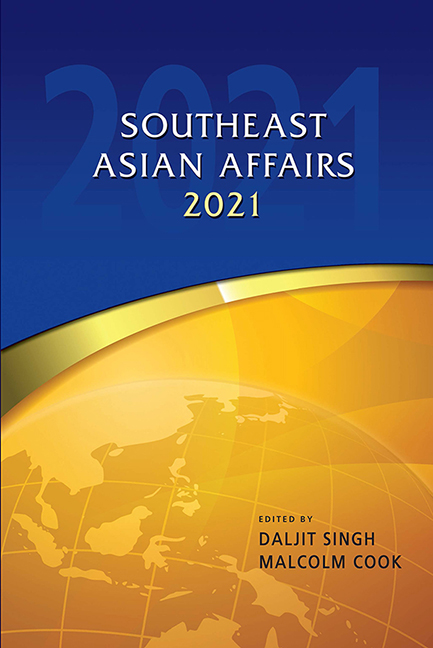Thailand and the COVID-19 Pandemic in 2020
Published online by Cambridge University Press: 09 October 2021
Summary
In January 2020, when Thailand reported the first COVID-19 case outside China, the country was predicted to be among the worst hit by the pandemic. In November, the head of the WHO praised Thailand as an “excellent example” of containing the virus. The death toll was sixty. Almost no deaths or domestic transmissions had occurred since June. The economic and social impact, however, was brutal, and the future prospects are uncertain. This article has four parts. The first summarizes the course of the pandemic. A lockdown over March to June choked off domestic transmissions, and a fortress strategy of closed borders prevented a subsequent wave. In the second part, we attribute this relative success in controlling the virus to the public health system developed over four decades by activism within the medical community. In the third part, we describe the economic impact. The lockdown was severe because around half of the workforce remains in the informal sector with little social protection, and because the fortress strategy inflicted severe pain on an economy highly dependent on exports, foreign investment and tourism. Recovery over the second half of the year was partial and patchy. The final section looks at prospects for the future. As the global recovery will be slow, the tourist industry and parts of manufacturing will suffer permanent damage. Thailand's outward-dependent economic model, which has been faltering for several years, is due for a makeover.
The Course of the Pandemic in 2020
The first case of COVID-19 outside China, a woman from Wuhan, was identified in Thailand on 12 January 2020; the first Thai case, a woman returning from Wuhan, was found ten days later; the first local transmission, a Bangkok taxi-driver, on 30 January; and the first death involved a retail worker exposed to Chinese tourists who was hospitalized on 16 February and died two weeks later. At this early stage, Thailand was predicted to be among the countries worst hit by the virus because of the large number of Chinese tourists—eleven million in 2019. Yet, as cases accumulated slowly, reaching forty-two at the end of February, economic analysts predicted only a short-term hit on the tourism industry, shaving less than 1 per cent of annual GDP growth, and a recovery by the end of the year. Both predictions proved to be spectacularly wrong.
- Type
- Chapter
- Information
- Southeast Asian Affairs 2021 , pp. 356 - 378Publisher: ISEAS–Yusof Ishak InstitutePrint publication year: 2021

